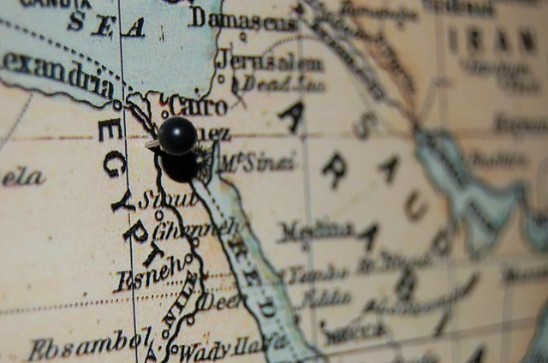 Source: Angela Rutherford
Source: Angela Rutherford
Egypt Calls on Allies
While the world’s focus has been directed towards Iraq and Syria for several years, another threat has been developing in the destabilized, extremist recruitment pool known as Libya. The Egyptian government had voiced concern over the downward spiral of its neighbor, but these warnings attracted few headlines. On February 15th, an Islamic State affiliate in Libya released a video depicting the beheading of 21 Egyptian workers. A new front has opened in the war against ISIS, and with it new allies are needed.
The destabilization of Libya has long posed a significant threat to Egyptian security, but until this most recent development it has taken a backseat to global interest in Iraq and Syria. An immediate Egyptian aerial bombardment of ISIS positions in Libya was foreseeable and of course justified. What has proven a more interesting development has been the efforts of Egyptian President Abdel Fattah El-Sissi in pursuing new alliances for a comprehensive and unified force against ISIS.
El-Sissi has asked that the United Nations implement a resolution for an international coalition to intervene in Libya. Western powers have demanded the creation of a unified and recognized Libyan government before arms, aid and political support can be given.
Even more surprising was El-Sissi’s statement on Sunday during a televised address on Egyptian state media that “The need for a unified Arab force is growing and becoming more pressing every day.” El-Sissi has been the first Arab leader to call for such a coalition. This is highly unusual among nations that are often distrusting and resentful of one another. But Egypt has growing political capital as it proves itself a vital element in the war against ISIS. “Egypt is an increasingly critical partner in these efforts” voiced Secretary of State John Kerry.
Paul Hamill, Director of Strategy and Communications for the American Security Project, has written at length about the situation on Egypt’s western border and the need for U.S. support. Much of his research can be read in “Libya: On the Brink”, a recently published report by the American Security Project. Paul points out that Egypt and the United States share a number of strategic and national security interests. Egypt is the largest Arab nation and therefore is a cornerstone of economic, social and ideological transformation in the region.
While the United States has the world’s most dominant military, strategic and durable success in countering violent extremism must come from Arab states. Paul writes in his recently published opinion editorial for The Hill, “We can never know enough of the local dynamics, history and politics to frame those strategic victories.” Fellow contributor Fadi Elsalameen, Adjunct Senior Fellow for the American Security project, also lent his expertise to the article. The subject matter experts will always be those closest to the problem. Also, this Arab coalition will not be as readily viewed as an occupying force or an exporter of Western culture.
While the United States and our allies have increased military operations in our mission to degrade and destroy ISIS, the group has expanded operations into Egypt’s backyard. This development should have been predictable given Libya’s lawlessness and power vacuum for three straight years. But our coalition cannot be everywhere all of the time. Victory over extremism must come from regional powers. Egypt will play a pivotal role in this fight. Arab and Western allies must work together towards the destruction of a mutual enemy as well as creating the foundations of lasting stability. We do not want American soldiers patrolling the streets of Tripoli. This means an increased reliance on Arab nations to police their neighbors when necessary.
Image Credit:






[…] Arab neighbors as well as the U.N to take a larger stake in the security of Libya. For too long, Egypt has voiced its concerns in vain. Global attention has been fixated on ISIS atrocities in Iraq and Syria. Meanwhile, Libya has been […]
[…] as 6 percent economic growth and a 10 percent reduction in unemployment in just five years, Egypt has positioned itself as the nexus for new business ventures in the Arab […]
[…] as 6 percent economic growth and a 10 percent reduction in unemployment in just five years, Egypt has positioned itself as the nexus for new business ventures in the Arab […]